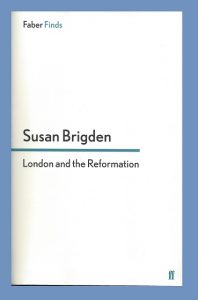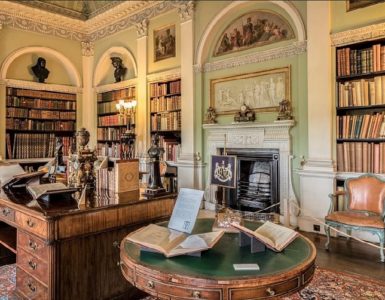 Several years ago while wandering through what is increasingly becoming harder to find, a bookstore, I ran across a copy of Susan Brigden’s, London and the Reformation. I would have loved to have purchased it but the sticker price was too high for my budget. Over the years I have checked for used copies online only to find that prices were even higher because the book was out of print. Recently, I discovered that the book has been available with a lower price since 2014 via on-demand printing by Faber Finds, Faber & Faber, London, England. The book has been reprinted in paperback with a pleasing, tactile, simple, but attractive cover. The print of the text looks very much like a first edition quality publication and the bone-tinted paper is pleasant with a hint of a sheen to provide sharp text for easy reading. The spine is well made which is important because this book requires some flexing and bending of the text block as one progresses through its 676 pages.
Several years ago while wandering through what is increasingly becoming harder to find, a bookstore, I ran across a copy of Susan Brigden’s, London and the Reformation. I would have loved to have purchased it but the sticker price was too high for my budget. Over the years I have checked for used copies online only to find that prices were even higher because the book was out of print. Recently, I discovered that the book has been available with a lower price since 2014 via on-demand printing by Faber Finds, Faber & Faber, London, England. The book has been reprinted in paperback with a pleasing, tactile, simple, but attractive cover. The print of the text looks very much like a first edition quality publication and the bone-tinted paper is pleasant with a hint of a sheen to provide sharp text for easy reading. The spine is well made which is important because this book requires some flexing and bending of the text block as one progresses through its 676 pages.
London and the Reformation has fourteen chapters that begin the story of the Reformation in 1534. Included in the author’s analysis are the religious and social backgrounds of the era, the importance of the Catholic Church for life and community, the changes during the reign of Henry VIII, the importance of the Act of Six Articles, the conflict between Catholicism (Thomas More is a key figure) and various reformers, the brief but influential Protestant rule of King Edward VI, the repressive reign of Mary I, and the beginning of the rule by Elizabeth I. Also in the book is a map showing the pervasive presence of over 100 parish churches within the roughly one-square mile walled city of London (24-25), and there are several tables including one listing London’s martyrs, 1555-1558 (608-612). London and the Reformation concludes with the author’s epilogue, a list of manuscript sources, and a detailed index. Thorough research using original sources has provided those interested in the Reformation in general and the English Reformation in particular with an invaluable resource.
London and the Reformation is not concerned with the theology of the Protestant Reformation and its influence on the city’s Catholics other than as it relates to the city’s general and political history. For example, the mass often enters the narrative simply because it constitutes the core of Roman Catholic liturgy and denying or accepting the mass became a convenient litmus test for discerning whether one was a traditionalist, Catholic, or an evangelical, Protestant. A scan of Brigden’s table of martyrs shows that almost exclusively, the reason for execution was, “denial of the mass.” The book does not discuss the early influence of Luther’s theology on the Lord’s Supper, ideas that came from John Calvin, or other influences from Protestants except as they relate to the author’s perspective on the era. For Brigden, the Reformation in London was chiefly promoted for political purposes resulting in suppressing the populace’s Catholicism; Londoners, generally, says Brigden, did not support Protestant changes. The closing words of the book comment—
A world was lost that could never be recovered. The altars and images, the dooms and roods of the parish churches, the towering spires, and peaceful cloisters of the religious houses were destroyed and profaned. But even the loss of such treasures was perhaps of little moment compared to the shattering of the beliefs which they had symbolized…Now, for the first time, the believer faced choices between diverging paths to salvation, and must examine his conscience to decide whether the godly and the ungodly, the Catholic and the Protestant, could live together “in charity.” The world of shared faith was broken by the Reformation and the Christian community divided. (638-639)
For Susan Brigden, the Reformation created confusion with much of the problem caused by the monarchy and its minions imposing Protestantism upon its populace for personal and political gains. It had been so easy before sola Scriptura, because there was simply, “The Church.” For Brigden, the reformers stirred things up with their different theology which resulted in disruption of the status quo. However, not noted by the author, the Reformation simply adapted the ad fontes principle of the Renaissance and applied it to the source for all theology, the Bible. From the sources reformers contended that judicious, careful, and deliberative plumbing the depths of the Bible was the way to understand God, his gracious salvation, and the nature of the church. Yes, the Reformation in London and elsewhere rattled things and brought division among those who professed Christianity, but its purpose was to turn people to Scripture and away from traditions that had developed without warrant from the Word.
However, I did not read London and the Reformation to gain insight into the theological issues separating Catholics and Protestants; I read it to learn more about what it was like in early modern London as Luther and his colleagues influenced others in reform. If one wants to read about the theology of the Reformation in England then a good choice would be Philip E. Hughes, Theology of the English Reformers, 1997, 2009, or for a shorter work, Carl Trueman’s contribution, “The Theology of the English Reformers,” to The Cambridge Companion to Reformation Theology, edited by D. Bagchi and D. C. Steinmetz, would be beneficial. For my purposes, Susan Brigden’s book was informative, copiously detailed (something I particularly enjoy), and a delight to read. Those who want to understand more about London in the first half of the sixteenth century and the influence of the Reformation should put London and the Reformation at the head of their reading lists. Also, Susan Brigden’s interesting article, “Youth and the English Reformation,” Past & Present, May 1982, pages 37-67, looks at the Reformation from the perspective of its appeal to rebellious youth, those in opposition to the powers that be, and provides a sixties, hippie generation perspective.
Hopefully, other publishers like Faber & Faber will pick up out-of-print titles to make them available once again and give authors the opportunity to resurrect their works for the generations that follow.
Barry Waugh





